Audi Q7 vs BMW iX2 – Which car suits you better?
Two cars, one duel: Audi Q7 meets BMW iX2.
Which one wins in performance, efficiency and value for money? Find out now!
Costs and Efficiency:
Price and efficiency are often the first things buyers look at. Here it becomes clear which model has the long-term edge – whether at the pump, the plug, or in purchase price.
BMW iX2 has a significantly advantage in terms of price – it starts at 43100 £, while the Audi Q7 costs 69300 £. That’s a price difference of around 26228 £.
As for range, the BMW iX2 performs clearly better – achieving up to 478 km, about 394 km more than the Audi Q7.
Engine and Performance:
Power, torque and acceleration are the classic benchmarks for car enthusiasts – and here, some clear differences start to show.
When it comes to engine power, the Audi Q7 has a clearly perceptible edge – offering 507 HP compared to 313 HP. That’s roughly 194 HP more horsepower.
In acceleration from 0 to 100 km/h, the Audi Q7 is noticeable quicker – completing the sprint in 4.10 s, while the BMW iX2 takes 5.60 s. That’s about 1.50 s faster.
In terms of top speed, the Audi Q7 performs distinct better – reaching 250 km/h, while the BMW iX2 tops out at 180 km/h. The difference is around 70 km/h.
There’s also a difference in torque: Audi Q7 pulls distinct stronger with 770 Nm compared to 494 Nm. That’s about 276 Nm difference.
Space and Everyday Use:
Cabin size, boot volume and payload all play a role in everyday practicality. Here, comfort and flexibility make the difference.
Seats: Audi Q7 offers evident more seating capacity – 7 vs 5.
In curb weight, BMW iX2 is slight lighter – 1960 kg compared to 2055 kg. The difference is around 95 kg.
In terms of boot space, the Audi Q7 offers clearly more room – 887 L compared to 525 L. That’s a difference of about 362 L.
In maximum load capacity, the Audi Q7 performs noticeable better – up to 2255 L, which is about 855 L more than the BMW iX2.
When it comes to payload, Audi Q7 decisively takes the win – 885 kg compared to 510 kg. That’s a difference of about 375 kg.
Who wins the race?
The Audi Q7 proves to be outperforms in nearly all aspects and therefore becomes our DriveDuel Champion!
Audi Q7 is the better all-rounder in this comparison.
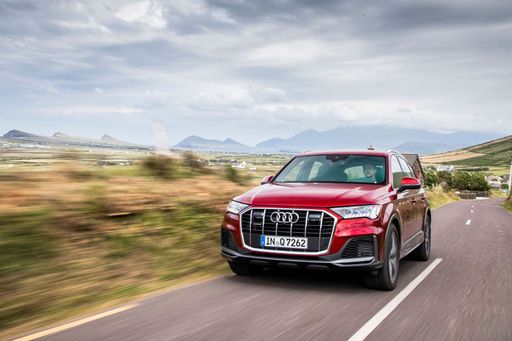
Audi Q7
Audi Q7
The Audi Q7 combines luxurious comfort with impressive versatility, making it a standout choice in the SUV market. Its sophisticated design and meticulous attention to detail create an elegant yet robust presence on the road. With advanced technology and a focus on safety, the Q7 ensures a premium driving experience for both the driver and passengers.
details @ audi-mediacenter.com
@ audi-mediacenter.com
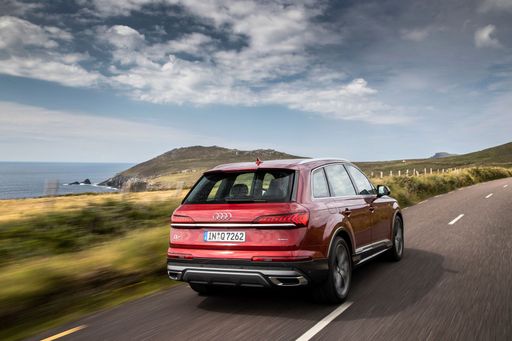 @ audi-mediacenter.com
@ audi-mediacenter.com
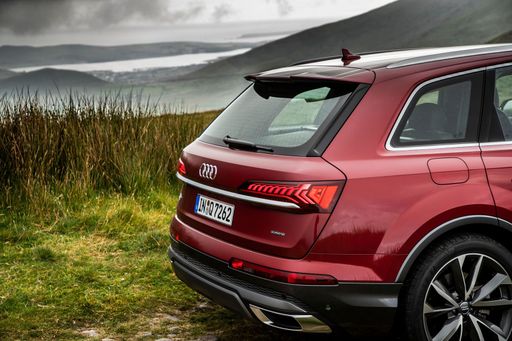 @ audi-mediacenter.com
@ audi-mediacenter.com
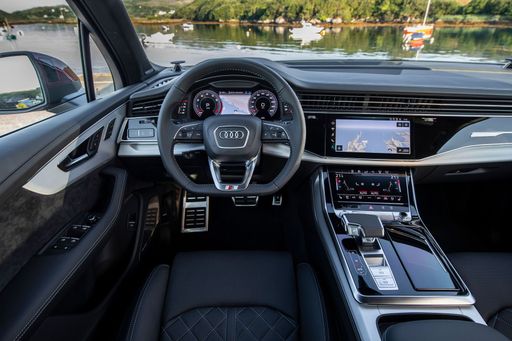 @ audi-mediacenter.com
@ audi-mediacenter.com
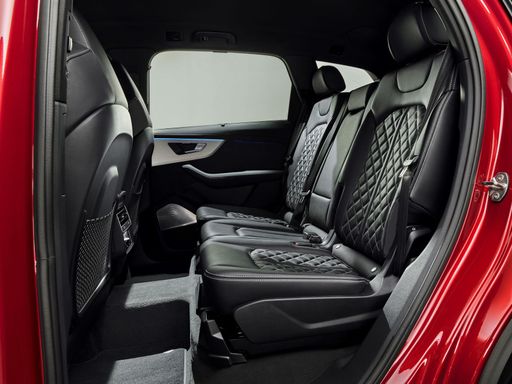 @ audi-mediacenter.com
@ audi-mediacenter.com
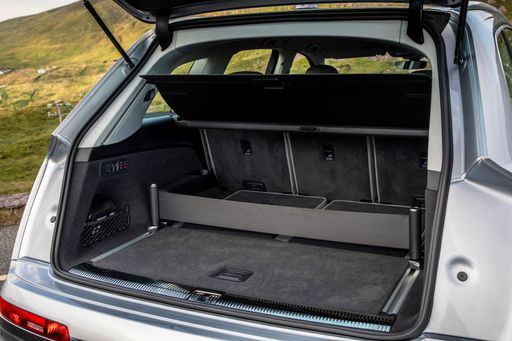 @ audi-mediacenter.com
@ audi-mediacenter.com
BMW iX2
The BMW iX2 stands out with its distinctive design and forward-thinking technology, making it a captivating choice for those interested in luxury electric vehicles. Its spacious interior and cutting-edge features offer both comfort and innovation, providing an exceptional driving experience. With a commitment to sustainability, this model is not just a statement of style but also an embodiment of the future of eco-conscious driving.
details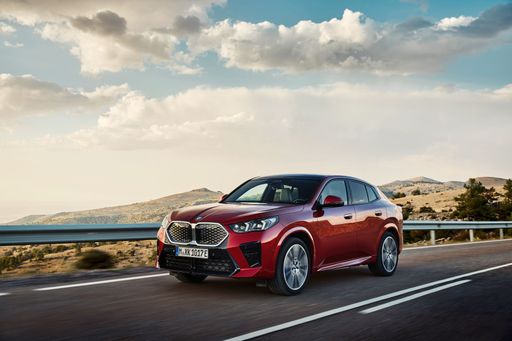 @ press.bmwgroup.com
@ press.bmwgroup.com
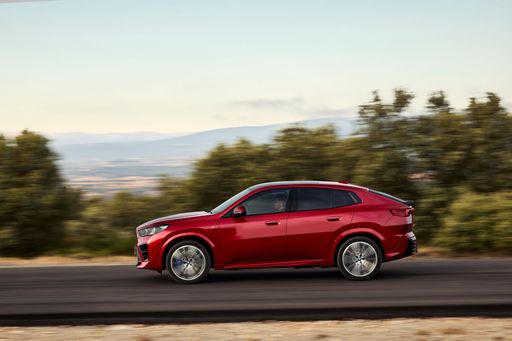 @ press.bmwgroup.com
@ press.bmwgroup.com
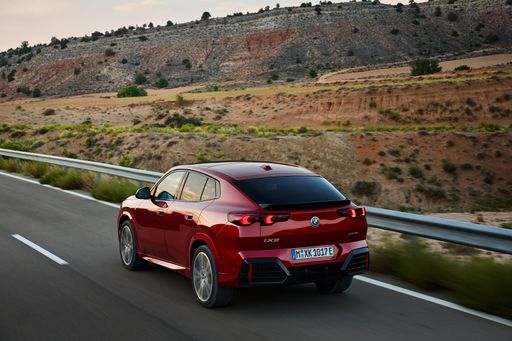 @ press.bmwgroup.com
@ press.bmwgroup.com
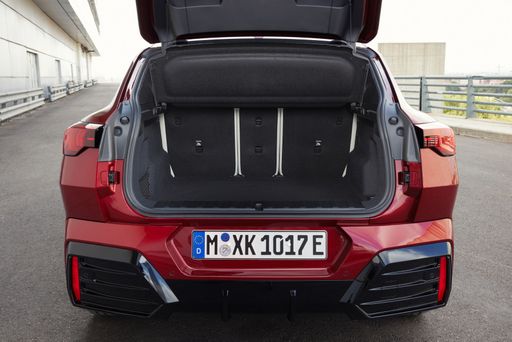 @ press.bmwgroup.com
@ press.bmwgroup.com

|

|
|
|
|
Costs and Consumption |
|
|---|---|
|
Price
69300 - 99000 £
|
Price
43100 - 54800 £
|
|
Consumption L/100km
1.2 - 11.9 L
|
Consumption L/100km
-
|
|
Consumption kWh/100km
-
|
Consumption kWh/100km
15.3 - 16.3 kWh
|
|
Electric Range
83 - 84 km
|
Electric Range
449 - 478 km
|
|
Battery Capacity
22 kWh
|
Battery Capacity
64.80 kWh
|
|
co2
28 - 271 g/km
|
co2
0 g/km
|
|
Fuel tank capacity
75 - 85 L
|
Fuel tank capacity
-
|
Dimensions and Body |
|
|---|---|
|
Body Type
SUV
|
Body Type
SUV
|
|
Seats
5 - 7
|
Seats
5
|
|
Doors
5
|
Doors
5
|
|
Curb weight
2055 - 2460 kg
|
Curb weight
1960 - 2095 kg
|
|
Trunk capacity
563 - 887 L
|
Trunk capacity
525 L
|
|
Length
5072 mm
|
Length
4554 mm
|
|
Width
1970 mm
|
Width
1845 mm
|
|
Height
1703 - 1735 mm
|
Height
1560 mm
|
|
Max trunk capacity
1863 - 2255 L
|
Max trunk capacity
1400 L
|
|
Payload
640 - 885 kg
|
Payload
500 - 510 kg
|
Engine and Performance |
|
|---|---|
|
Engine Type
Petrol MHEV, Plugin Hybrid, Diesel MHEV, Petrol
|
Engine Type
Electric
|
|
Transmission
Automatic
|
Transmission
Automatic
|
|
Transmission Detail
Automatic Gearbox
|
Transmission Detail
Reduction Gearbox
|
|
Drive Type
All-Wheel Drive
|
Drive Type
Front-Wheel Drive, All-Wheel Drive
|
|
Power HP
231 - 507 HP
|
Power HP
204 - 313 HP
|
|
Acceleration 0-100km/h
4.1 - 7.1 s
|
Acceleration 0-100km/h
5.6 - 8.6 s
|
|
Max Speed
226 - 250 km/h
|
Max Speed
170 - 180 km/h
|
|
Torque
500 - 770 Nm
|
Torque
250 - 494 Nm
|
|
Number of Cylinders
6 - 8
|
Number of Cylinders
-
|
|
Power kW
170 - 373 kW
|
Power kW
150 - 230 kW
|
|
Engine capacity
2967 - 3996 cm3
|
Engine capacity
-
|
General |
|
|---|---|
|
Model Year
2025
|
Model Year
2024
|
|
CO2 Efficiency Class
G, B
|
CO2 Efficiency Class
A
|
|
Brand
Audi
|
Brand
BMW
|
Is the Audi Q7 offered with different drivetrains?
Available configurations include All-Wheel Drive.
The prices and data displayed are estimates based on German list prices and may vary by country. This information is not legally binding.
